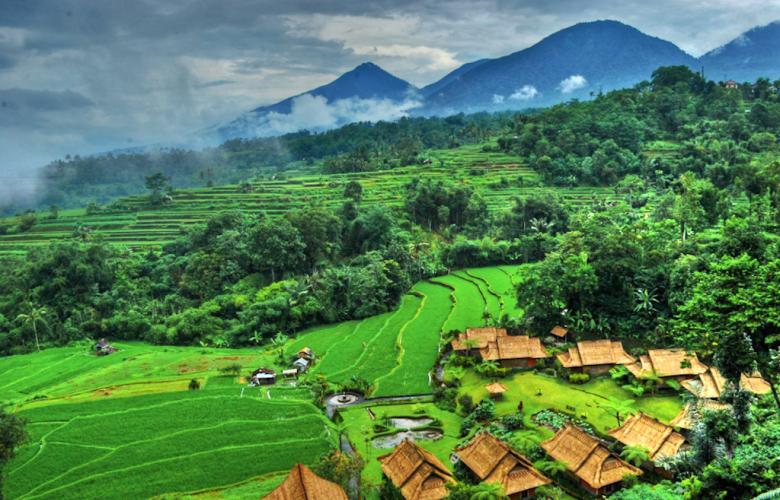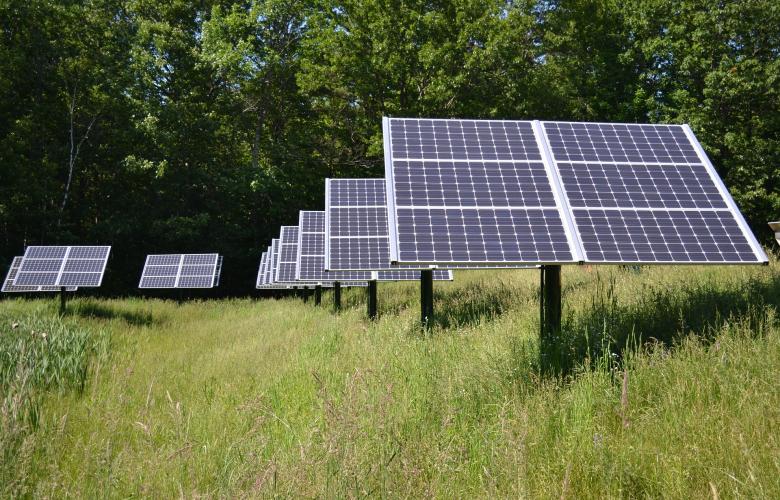It is no secret the technology is there to make Bali (and many other places) a greener, more eco-friendly place to live and to visit. The money is there too. And for years, it has been regular folk who have been supporting groups and communities with initiatives around beach cleaning and waste management.
But now the missing piece of the jigsaw could well be in place - political will.
There is a 'green wave' rolling through Bali and the new administration of Governor Wayan Koster and Vice Governor Cok Ace appear to be the ones riding it.
In the short space of time since they started their administration in September, Koster and Ace have taken some bold moves to point Bali in a more environmentally friendly direction. Some plans and initiatives may not eventuate, but the intention is certainly plain to see.

Bali's natural beauty is worth protecting with eco-friendly, green initiatives from the local administration, property developers and the hotel industry.
The new administration almost immediately publicly scrapped the idea of the Benoa Bay reclamation project, which has been causing concern for many local communities since its inception in 2013/14. However, it is worth remembering, as Gapura Bali reported in September, that the Governor does not have the power to scrap the project. Only a Presidential decree can do this. But it's the thought that counts.
Bye-Bye Plastic Bags
Back in 2013, two sisters from Bali's Green School, Isabel and Melati Wijsen, created the 'Bye Bye Plastic Bags' movement. They spent years trying to convince then Governor, Pastika to ban plastic bags in Bali. Eventually, their petition was heard and Pastika agreed to make Bali plastic bag free by 2018. Unfortunately, this never happened.
But this last week, according to Coconuts Bali, Mayor Mantra with support from Koster, announced Regulation no. 36/2018, which states the local government will be prohibiting the use of plastic bags in shops starting January 1, 2019.
Alternative Energy
Bali still relies heavily on Java for its energy supply. But this has proved to be insufficient for Bali's growing power needs as tourism numbers swell. PLN, proposed the Java-Bali Crossing to address this and that would mean the construction of two 376-metre tall towers in West Bali to make use of excess power generated from the Paiton Steam Power Plant in East Java.
However, a number of cultural and religious objections have stalled the idea, as tall constructions are considered inappropriate in Bali. This in turn has prompted more initiatives for Bali to produce its own power through New and Renewable Energy (EBTs) including geo-thermal, solar, wave and wind power plants.
Last week, the Provincial Government of Bali together with the legislative body prepared a Regional Regulation (Perda) on the island's energy plans. According to Merdeka, this was then followed up by Governor Koster with a Governor Regulation (Pergub) concerning the use and development of clean energy in Bali. "We have to prepare an independent energy preparation scenario for the next 5-10 years," Koster said.

"We have to prepare an independent energy preparation scenario for the next 5-10 years," Koster said.
Impact on Tourism
Republika are reporting this will have a significant impact on Bali's tourism industry, which accounts for 67 percent of the total gross regional domestic income and affects around 70 percent of the island's population. Why? Because of air quality according, to Greenpeace Southeast Asia climate and energy researcher Adila Isfandiari, who cited the negative impacts of the Celukan Bawang Steam Power Plant (PLTU) in North Bali, which is powered by coal.
In an article published earlier this year, Reuters reported local fishermen near Singaraja were complaining the pollution and emisions generated by the plant were reducing the number of fish they were able to catch.
Finding Balance
The result is Governor Koster is encouraging environmentally friendly and sustainable clean energy. Kuta News is following Koster's movements around something called Bali Mandiri Energy. This appears to be focused on the utilization of renewable energy including solar power, hydropower, wind power, biomass, ocean currents, gas (LPG, LNG, CNG) as clean and environmentally friendly alternative sources of energy.
“The development and utilization of renewable clean energy will continue to be developed, with energy sources that are environmentally friendly," said Koster, "so the nature of Bali will be clean, with clean and healthy air the community will be healthy. This is in line with the vision of Nangun Sat Kerthi Loka Bali, which maintains the balance of nature, people and culture in all aspects."
Koster is being reported as saying he hoped the use of LNG in hotel operations can be a driving force for other industries in a commitment to use clean energy on a small or large scale, which in turn will support economic growth and community welfare.
Electric Trains
The latest green initiative getting the support of the local administration is that of an electric train, which is being pushed to replace the recently terminated public bus network most observers would agree failed miserably.
The proposed train system will be the second major infrastructure programme after what is being called the Shortcut Point 5-6, a 1.9 kilometre stretch of road connecting the Wanagiri village area around Yeh Ketipat Temple to the east, to Pegayaman, Banjar Wirabuana and Gitgit in the northern regency of Buleleng, the regency earmarked to be the site of the next Bali airport.
An electric train system, however, is not being greeted enthusiastically by many local communities because of what they see as 'land constraints.'

For many tourists, fertile plains, rice fields and mountains are synonymous with Bali.
Economic Impact
A greener, more environmentally friendly Bali is no longer a utopian dream. The economic impacts have brought the issue well and truly into mainstream consciousness, especially since other tourist hotspots in the region, such as Boracay in The Philippines and Maya Bay on Ko Phi Phi in Thailand, have literally closed down and suffered enormous financial losses from pollution and poor waste management after being inundated with more tourists than they could handle.
Zero Dollar Tourism
This latter point is also something Governor Koster is well aware of, recently criticizing tour operators and agents for running monopolies and exploiting the growing Chinese tourist market, which currently dominates Bali's tourism industry.
Koster believes unscrupulous syndicates are selling Bali too cheaply with package holidays at rock bottom prices, bringing in thousands of Chinese tourists who do not contribute to the local economy because they do not spend.
Around 3,000 - 3,500 Chinese tourists arrive in Bali every day, according to a recent report in Bisnis, 60% of which are on cheap tour package schemes.
Detik Travel are also reporting Chinese businessmen are working with illegal travel agents in Bali who use shops owned by Chinese selling goods made in China but claimed to be made in Bali or Indonesia. Minister of Tourism Arief Yayha told Detik Travel this Zero Dollar Tour business has negative implications for both countries as Chinese tourists feel cheated and the local Balinese economy sees no benefits.
Sustainable Travel Trend
The perception this creates is also worth taking seriously as it undermines Bali's reputation as one of the world's leading tourist destinations, especially in the high-end luxury space.
Travel Agent Central recently released the findings of the Booking.com's Sustainable Travel Report, published earlier this year, which claims 87 percent of global travelers want to travel sustainably. This means staying in eco-friendly or green accommodations to reduce environmental impact, eating in local restaurants using local ingredients and buying local souvenirs as a result.
The report surveyed more than 12,000 respondents across 12 markets; Australia, Brazil, Canada, China, Germany, France, India, Italy, Japan, Spain, the UK and the United States.
Sources: Coconuts Bali, Gapura Bali, Republika, Detik Travel, Merdeka, Kuta News, Bisnis, Travel Agent Central
Similar to this:
Tri Hita Karana Roadmap: Blended Finance for Better Business
PLN to build solar energy units in East and West Bali
A first in Bali: turning trash into alternative energy











